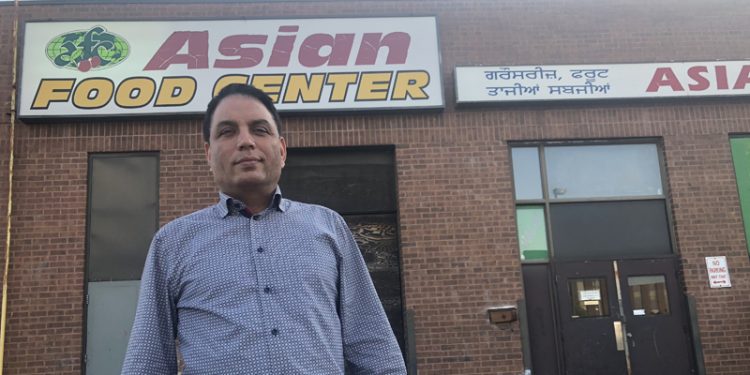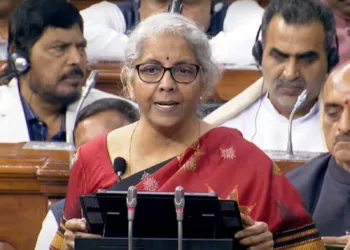Thee brothers from Ballowal village in Jalandhar dominate Canada’s retail market
By Gurmukh Singh

Old-timers in the Indian diaspora in Toronto and Vancouver nostalgically recall the 1960s and 1970s when there was only a handful of Indians in Canada. They say that the thing they missed most was Indian food. So much so that anybody going to India in those days would get a bagful of requests to bring back packs of dal and masala. Indian food was a rarity here back then.
Canada is awash with spicy Indian food today, thanks to the exponential growth of the diaspora and the cuisine’s growing popularity across all ethnicities. Go visit any restaurant in Toronto’s Gerrard India Bazaar — North America’s first Indian bazaar — and you will find more white Canadians than Indo-Canadians there.
The craze for Indian food has spawned related businesses to meet the ever-rising demand. Across Canada today, there are roti chains, desi dairy chains and samosa factories. One such business that stands out is the Toronto-based Asian Food Centre.
With 10 super stores across Ontario and Alberta, this Indian grocery chain has become the Walmart of the South Asian community across Canada.
Founded in 1996 by three brothers from Ballowal village near Jalandhar in Punjab, it has become the biggest ethnic food chain in the country.
Go visit any restaurant in Toronto’s Gerrard India Bazaar – North America’s first Indian bazaar – and you will find more white Canadians than Indo-Canadians there.
The top Canadian newspaper The Globe and Mail has, in fact, listed it among the top five super stores in Toronto.

“We are happy that we have been recognised as one of the top super stores by the respected newspaper. The Asian Food Centre is your one-stop Indian shop for all your basic needs — be it grocery items, herbs, vegetables, meats, fruits, freshly prepared delicacies, readymade vegetable dishes, frozen food, pizzas, pasta, top Indian brands, kitchenware, etc. You name any item, and we have it,” explains owner and CEO Mejor Singh Natt, sitting in his corporate office in Etobicoke in Toronto.
With over 5,000 items on its shelves, this grocery chain today caters to all segments of society. “Definitely, a good chunk of our customers are mainstream white Canadians, because they love Indian food. We also get orders from the US and even Britain,” says Natt.
As the fast-growing Indo-Canadian community spreads to smaller cities and towns away from Toronto and Vancouver, Natt says his chain has plans to expand into these places. “As part of our expansion plans, the Asian Food Centre will open smaller stores in cities such as Niagara, Woodstock and Windsor in Ontario. Then we will look at options in other provinces,” he says.
Though the Asian Food Centre may be a desi food chain, it has a professional corporate structure that runs its operations. As the group CEO explains, “We three brothers may own this business, but we put in place a corporate structure to run our operations, from day one. The brothers have their allotted areas of responsibility, but professionals run our operations. In a nutshell, we are a family business with a corporate structure.”
This group makes the bulk of its purchases in India. “We buy most of our products from India. We order products to be made to our specifications and then label them with our logo. I am in India often and have attended the Indus food festivals in Delhi to meet with suppliers. I have also been to India as part of the Indo-Canada Chamber of Commerce delegations and met the chief ministers of Punjab and Haryana.”
The group sources most of its general items from China and frozen products from Bangladesh.
Interestingly, the Asian Food Centre is a leader in the herbal business in Canada. “Yes, herbs are a major part of our business. In fact, we are the leader in this business. Herbs have become popular as alternative medicine. Ayurvedic practitioners recommend our super stores to their clients, for herbs. We source all sorts of herbs from different parts of the world,” he says.
According to Natt, herbs proved to be a godsend for his employees and the Indo-Canadian community when COVID-19 struck and there was no medicine for it.
“Our herb stocks flew off the shelves. Stuck at home, people consumed concoctions of Baijnath, Zandu and Dabur recipes. Herbs kept our employees going. “Lokan ne kade bana bana ke pite COVID tohn bachn layee (people drank cocktail after herbal cocktail to ward off the COVID-19 virus).”
The pandemic turned out to be a big threat as well as an opportunity. In the early days, panic buyers made a run on this Indo-Canadian grocery chain’s stocks. Supply chains stopped.
“It was an unimaginable crisis,” says Natt. “As flights and shipments stopped, supplies dried up and prices shot up. But fortunately, we had enough stock in our warehouse of 50,000 square feet. Our teams worked very hard and our suppliers soon resumed the shipments. The big lesson we learnt from the COVID crisis is to buy locally to encourage local production and farming.”
As the pandemic shut Canada down, the grocery chain stepped up to provide free meals to the needy and donated to local food banks. The group also extended a helping hand to Indian students studying in Canada. “We have a deep connection with Indian students, as they are our big customers. We helped them by hiring them, and many students are now working with us.”
The grocery chain CEO also sent help to his native Ballowal village in Punjab, as India too imposed a COVID-19 lockdown. “We sent money to the village to provide rations to the people stuck at home because of the lockdown. Even in normal times, we keep sending money to our village for various community activities.”
A graduate of Sikh National College Banga, Natt left India for California in 1987. “I was in California till 1994 when a marriage proposal came along and I landed in Toronto.”
A globetrotter, he also spent some time in Argentina, becoming fluent in Spanish. And the fluency in Spanish is coming in handy now as he often jets to Latin America to source fruits and vegetables for his grocery chain.
“My Spanish helps me as I am very often in Cuba, Costa Rica, the Dominican Republic and Mexico. We get most of our supplies of mangoes, avocados, turmeric and other items from that part of the world.”
Coming from a farming background, he says he always wanted to do something related to the food business.
“So, when I came to Canada in 1994, I worked for a pizza chain for two years and then started the Asian Food Centre in 1996 to realise my dream of owning a food business. In 2000, we opened our second super store and here we are today with 10 super stores,” says Natt, sounding as if this is just the beginning.
With over 200 staff on its rolls, the group is already one of the biggest private employers for new Indian immigrants and students.
The next big thing on his agenda? “Two things. Readymade items and frozen food. Our readymade items such karela [bitter gourd] fly off the shelves and there is a growing craze for frozen food in the diasporic communities in Canada,” says Natt, signing off.
(The author is a Toronto-based journalist.)








